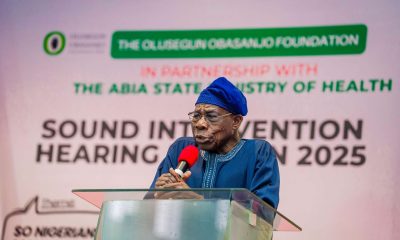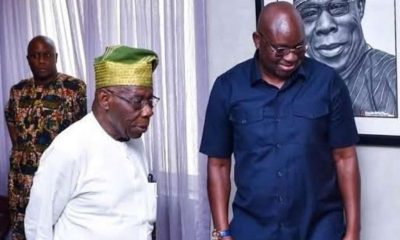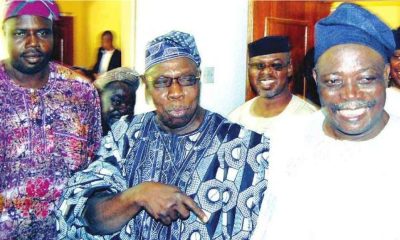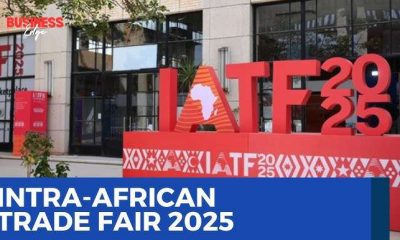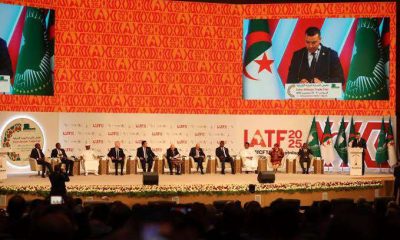Business
Obasanjo urges Africa to cut ties with IMF, World Bank, embrace regional trade solutions

Chief Olusegun Obasanjo, former Nigerian president, Chief Olusegun Obasanjo, has warned African nations against continued reliance on international financial institutions such as the World Bank and the International Monetary Fund (IMF), insisting that they were never designed to serve Africa’s best interests.
Speaking on Monday during an interview at the ongoing Intra-Africa Trade Fair (IATF) in Algiers, Obasanjo urged African leaders to look inward, strengthen intra-continental trade, and promote regional economic integration as the foundation for sustainable growth.
“The World Bank is not for us, the IMF is not for us. And when we understand that these institutions are not for us, we will be better informed about how we relate with them,” he said.
Obasanjo used Nigeria’s dramatic currency depreciation to illustrate what he described as Africa’s economic vulnerability.
“When I was leaving office as head of state in 1978, the naira was almost $2. Today, $1 is ₦1,600. What has Nigeria done to devalue the currency to that extent? Something must be wrong. I don’t believe that in my own lifetime, and I’m talking about 45 years, this is normal,” he lamented.
The former leader said that while internal policy failures contributed to the crisis, structural dependency on foreign financial systems and the dominance of the U.S. dollar remain critical factors undermining African economies.
Obasanjo applauded the African Export-Import Bank (Afreximbank) for introducing mechanisms that allow African businesses to settle transactions in local currencies. According to him, initiatives like Afreximbank and the African Continental Free Trade Area (AfCFTA) hold the key to Africa’s economic independence.
“If we are transacting business between Algeria and Uganda, the seller in Uganda needs shillings, not dollars. If you can give him shillings, why should you be looking for dollars? Why should the dollar make my own currency worthless? That is the sort of thing we should be looking at,” he stressed.
He argued that local currency trade settlements could help curb the pressure on African currencies, which often results from high demand for dollars in cross-border transactions.
The case for AfCFTA and IATF
Obasanjo called on African leaders to fully embrace AfCFTA, describing it as a game-changer for boosting intra-African trade, creating jobs, and reducing external vulnerability.
“What should we do that will make us no longer dependent on these institutions that are not made for us is to support the African Continental Free Trade Area and the Intra-Africa Trade Fair. These are the things that will take us away from what is not created for us,” he said.
The IMF and World Bank have long faced criticism for imposing austerity measures, structural adjustment programmes, and high-interest loans that many African leaders argue have deepened poverty rather than alleviating it.
These conditions often include currency devaluations, subsidy removals, and fiscal tightening, policies that have sparked social unrest across the continent.
Experts note that such prescriptions have rarely led to sustainable growth, leaving African nations heavily indebted and dependent on external financing. This reality, Obasanjo suggests, underscores the need for homegrown solutions and collaborative frameworks like AfCFTA.
With Africa accounting for only 15% of global trade and most of its transactions conducted with external partners, Obasanjo’s warning comes at a time when policymakers are pushing to reverse this trend. The AfCFTA, which became operational in 2021, aims to create a single African market of 1.4 billion people with a combined GDP of $3.4 trillion, reducing reliance on external trade partners.
However, analysts caution that success will depend on political will, infrastructure development, and harmonization of trade policies across member states.
Obasanjo concluded by reaffirming his belief that Africa’s economic liberation will not come from Washington or Brussels, but from within the continent.
“Submission to debt is like submission through military force. If we allow ourselves to be dominated by creditors because of debt, we lose our freedom,” he warned.


